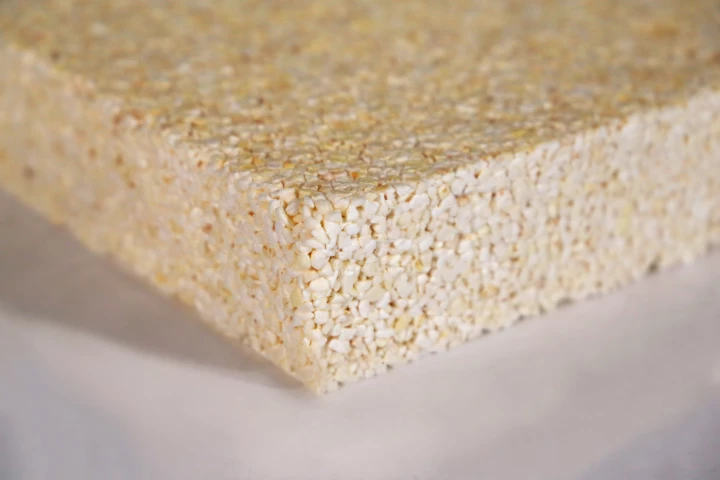Insulation
-
Although various uses for post-harvest rice husk waste are being explored, the stuff is still usually incinerated, dumped in landfills, or composted. Soon, however, rice husks may be combined with discarded newspapers to form eco-friendly insulation.
-
Expanded polystyrene (EPS) foam is a problematic material, in that it's cheap and lightweight but also non-biodegradable and difficult to recycle. German scientists have developed a possible alternative, though – foam made out of popcorn.
-
Heating and cooling systems are some of the biggest energy guzzlers, but passive temperature control could reduce emissions. Phase-change materials show promise for this, and now engineers have developed a new PCM composite that can be 3D printed.
-
Many "cold chain" items such as food or medicine are shipped in single-use expanded polystyrene foam (EPS) packaging, which is difficult to recycle and non-biodegradable. Such is not the case with a new material, however, made from discarded paper.
-
Kevlar and Twaron are tough materials, but there’s a bit of a trade-off to be made between strength, heat resistance and weight. Now, researchers have created a new nanofiber material that’s just as strong, but much more insulating against heat.
-
Different materials can play different roles when it comes to trapping and dissipating heat. But could one material have it both ways? A new breakthrough suggests that it could, made by scientists who believe heat needn’t just be a one way street.
-
When buildings are being insulated or torn down, a lot of waste "mineral wool"-type insulation ends up in the landfill. Thanks to new research, however, that material may soon instead find use in an improved type of construction mortar.
-
For years now, scientists have marvelled at the insulating qualities of polar bear fur, suggesting that it could inspire manmade heat-retaining materials. Well, Chinese researchers have now developed just such a substance, which reportedly outperforms real fur.
-
Styrofoam isn't eco-friendly stuff. It's made from petroleum, it can't be efficiently recycled, it's non-biodegradable, and it creates pollution when burned. A new plant-based foam reportedly has none of those drawbacks, however, plus it's claimed to actually insulate better than regular Styrofoam.
-
Back in 2014, we heard how scientists from Germany's Fraunhofer Institute for Wood Research had developed a wood-based foam that could be used as eco-friendly insulation. Now, they've combined it with metal to create a composite that has a much wider range of potential applications.
-
Aerogels are among the best thermal insulators, but their cloudy appearance doesn't work for windows, one of the worst offenders for letting heat escape a building. Now, researchers at Colorado University Boulder have found a way to make them transparent, recycling a beer by-product in the process.
-
A couple of years ago, researchers from MIT created a beaver fur-inspired material that could be used to produce warmer wetsuits. Now, a different group of MIT scientists have devised a process that lets existing wetsuits retain body heat three times longer than normal.
Load More











